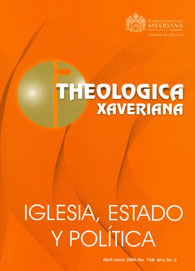Abstract
Political praxis is a constituent and essential part of Christian living, as much at the personal as at the ecclesial level. This dynamic is characterized by having as an absolute reference point the historic experience of Jesus in the exercise of popular sovereignty (which seeks the construction of common good), the separation of Church and State, the prevalence of ethics and right, the realization of the preferential option for the poor and the constitution of an authority and minimal consensus at the local, national and international levels. The purpose of this paper is to assess the ethical-theological foundations starting from the biblical facts, the Church tradition and the engagement of Christian contemporary community. The
present publication is the first part of a text which will be completed in the next issue of this magazine.
This journal is registered under a Creative Commons Attribution 4.0 International Public License. Thus, this work may be reproduced, distributed, and publicly shared in digital format, as long as the names of the authors and Pontificia Universidad Javeriana are acknowledged. Others are allowed to quote, adapt, transform, auto-archive, republish, and create based on this material, for any purpose (even commercial ones), provided the authorship is duly acknowledged, a link to the original work is provided, and it is specified if changes have been made. Pontificia Universidad Javeriana does not hold the rights of published works and the authors are solely responsible for the contents of their works; they keep the moral, intellectual, privacy, and publicity rights.
Approving the intervention of the work (review, copy-editing, translation, layout) and the following outreach, are granted through an use license and not through an assignment of rights. This means the journal and Pontificia Universidad Javeriana cannot be held responsible for any ethical malpractice by the authors. As a consequence of the protection granted by the use license, the journal is not required to publish recantations or modify information already published, unless the errata stems from the editorial management process. Publishing contents in this journal does not generate royalties for contributors.


